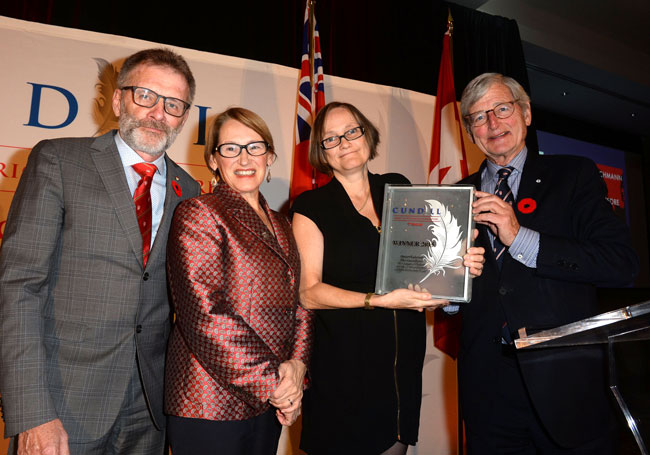
Last night, at a gala dinner in Toronto, Susan Pedersen was announced as the winner of the 2015 Cundill Prize in Historical Literature at McGill. Pedersen walked away with the $75,000 US grand prize for her book The Guardians: The League of Nations and the Crisis of Empire. Now in its eighth year, the Cundill Prize is the world’s most lucrative international award for a nonfiction book.
Pedersen’s book is a riveting work of global history that tells the story of the League of Nations. At the end of the First World War, the Paris Peace Conference saw a battle over the future of empire. The victorious allied powers wanted to annex the Ottoman territories and German colonies, Woodrow Wilson and a groundswell of anti-imperialist activism stood in their way. The countries reluctantly agreed to hold and administer those allied conquests under the new League of Nations. The Guardians enables readers to see the League with new eyes, and in doing so, appreciate how complex, multivalent, and consequential this first great experiment in internationalism really was.
In addition to the winner, the two remaining finalists were each awarded a “Recognition of Excellence” prize of US$10,000.
Sven Beckert’s Empire of Cotton: A Global History is an epic story of the rise and fall of the empire of cotton, its centrality to the world economy, and its making and remaking of global capitalism. “Cotton is so ubiquitous as to be almost invisible, yet understanding its history is key to understanding the origins of modern capitalism” writes Sven Beckert. The award winning historian tells the story of how European entrepreneurs and powerful statesmen recast the world’s most significant manufacturing industry, combining imperial expansion and slave labor with new machines and wage workers to change the world.
Eichmann Before Jerusalem: The Unexamined Life of a Mass Murderer provides the world with a true understanding of the Manager of the Holocaust, Adolf Eichmann. Hamburg-based philosopher Bettina Stangneth has used previously un-mined archival sources, particularly Eichmann’s own compulsive notes made in exile, in conjunction with a recently discovered series of taped conversations to give a chilling portrait not of a reclusive, taciturn war criminal on the run in Argentina, but of a highly skilled manipulator with an inexhaustible ability to reinvent himself, an unrepentant mass-murderer eager for acolytes to discuss past glories and political plans for the future.
“Celebrating the vital work of historians and the role of history in our societies is fundamental to the core values of the Cundill Prize. McGill University is proud to administer the Cundill Prize and we are delighted with the quality of the books that were entered,” said Prof. Hudson Meadwell, who serves as Administrative Chair of the Cundill Prize. “Each year we see growing interest in this Prize. The Prize will continue to identify and to reward those works that shape our historical understanding of the world.”
This year’s Cundill jury included Anthony Cary, British Commissioner of the Commonwealth Scholarship and Fellowship Plan; David Frum, author and editor for The Atlantic; Chad Gaffield, University of Ottawa Professor of History and University Research Chair in Digital Scholarship; Maya Jasanoff, Coolidge Professor of History and Harvard College Professor at Harvard University (Liberty’s Exiles: American Loyalists in the Revolutionary World); and author Anna Porter, (Buying a Better World: George Soros and Billionaire Philanthropy, The Ghosts of Europe) winner of the Shaughnessy Cohen Prize for Political Writing.
The Cundill Prize in Historical Literature at McGill is the world’s most important international nonfiction literature prize. It was established in 2008 by McGill alumnus F. Peter Cundill, who passed away in January 2011. The prize is administered by McGill’s Dean of Arts, with the help of the McGill Institute for the Study of Canada, and is awarded annually to an individual who has published a book determined to have had a profound literary, social and academic impact in the area of history.
